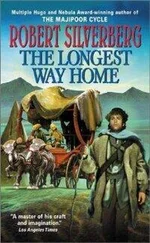Poul Anderson - The Long Way Home
Здесь есть возможность читать онлайн «Poul Anderson - The Long Way Home» весь текст электронной книги совершенно бесплатно (целиком полную версию без сокращений). В некоторых случаях можно слушать аудио, скачать через торрент в формате fb2 и присутствует краткое содержание. Жанр: Фантастика и фэнтези, на английском языке. Описание произведения, (предисловие) а так же отзывы посетителей доступны на портале библиотеки ЛибКат.
- Название:The Long Way Home
- Автор:
- Жанр:
- Год:неизвестен
- ISBN:нет данных
- Рейтинг книги:5 / 5. Голосов: 1
-
Избранное:Добавить в избранное
- Отзывы:
-
Ваша оценка:
- 100
- 1
- 2
- 3
- 4
- 5
The Long Way Home: краткое содержание, описание и аннотация
Предлагаем к чтению аннотацию, описание, краткое содержание или предисловие (зависит от того, что написал сам автор книги «The Long Way Home»). Если вы не нашли необходимую информацию о книге — напишите в комментариях, мы постараемся отыскать её.
The Long Way Home — читать онлайн бесплатно полную книгу (весь текст) целиком
Ниже представлен текст книги, разбитый по страницам. Система сохранения места последней прочитанной страницы, позволяет с удобством читать онлайн бесплатно книгу «The Long Way Home», без необходимости каждый раз заново искать на чём Вы остановились. Поставьте закладку, и сможете в любой момент перейти на страницу, на которой закончили чтение.
Интервал:
Закладка:
They emerged on a bridgeway and let its moving belt carry them along, dizzily high over the city. At this altitude, Langley could see that Lora was built as a single integrated unit: no building stood alone, they were all connected, and there was a solid roof underneath decking over the lower levels. Chanthavar pointed to the misty horizon, where a single great tower reared skeletal. “Weather-control station,” he said. “Most of what you see belongs to the city, Ministerial public park, but over that way is the boundary of an estate belonging to Tarahoë. He raises grain on it, being a back-to-nature crank.”
“Haven’t you any small farms?” asked Langley.
“Space, no!” Chanthavar looked surprised. “They do on the Centaurian planets, but I’d find it hard to imagine a more inefficient system. A lot of our food is synthesized, the rest is grown on Ministerial lands—in fact, the mines and factories, everything is owned by some Minister. That way, our class supports itself as well as the Commons, who on the extrasolar planets have to pay taxes. Here, a man can keep what he earns. Public works like the military forces are financed by industries owned in the name of the Technon.”
“But what do the Commoners do?”
“They have jobs—mostly in the cities, a few on the land. Some of them work for themselves, as artisans or meditechs or something similar. The Technon gives the orders on how to balance population and production, so that the economy runs a smooth course. Here, this ought to interest you.”
It was a museum. The general layout had not changed much, though there was a lot of unfamiliar gadgetry for better exhibition. Chanthavar led them to the historical-archeological section, the centuries around their own time. It was saddening how little had survived: a few coins, age-blurred in spite of electrolytic restoration; a chipped glass tumbler; a fragment of stone bearing the defaced name of some bank; the corroded remnant of a flintlock musket, found in the Sahara when it was being reclaimed; broken marble which had once been a statue. Chanthavar said that the Egyptian pyramids, part of the Sphinx, traces of buried cities, a couple of ruined dams in America and Russia, some hydrogen-bomb craters, were still around, otherwise nothing earlier than the Thirty-fifth Century. Time went on, relentlessly, and one by one the proud works of man were lost.
Langley found himself whistling, as if to keep up his courage. Chanthavar cocked an inquisitive head. “What’s that?”
“Conclusion to the Ninth Symphony— Freude, schöne Götterfunken —ever hear of it?”
“No.” There was a curious, wistful expression on the wide bony face. “It’s a shame. I rather like that.”
They had lunch at a terrace restaurant, where machines served a gaily dressed, stiff-mannered clientele of aristocrats. Chanthavar paid the bill with a shrug. “I hate to put money into the purse of Minister Agaz—he’s after my head—but you must admit he keeps a good chef.”
The guards did not eat; they were trained to a sparse diet and an untiring watchfulness.
“There’s a lot to see, here in the upper levels,” said Chanthavar. He nodded at the discreet glow-sign of an amusement house. “But it’s more of the same. Come on downside for a change.”
A gravity shaft dropped them two thousand feet, and they stepped into another world.
Here there was no sun, no sky; walls and ceiling were metal, floors were soft and springy, and a ruler-straight drab-ness filled Langley’s vision. The air was fresh enough, but it throbbed and rang with a noise that never ended—pumping, hammering, vibrating, the deep steady heartbeat of that great machine which was the city. The corridors—streets -were crowded, restless, alive with motion and shrill talking.
So these were the Commoners. Langley stood for a moment in the shaft entrance, watching them. He didn’t know what he had expected—gray-clad zombies, perhaps —but he was surprised. The disorderly mass reminded him of cities he had seen in Asia.
Dress was a cheap version of the Ministerial: tunics for men, long dresses for women; it seemed to fall into a number of uniforms, green and blue and red, but was sloppily worn. The men’s heads were shaven; the faces reflected that mixture of races which man on Earth had become; there were incredible numbers of naked children playing under the very feet of the mob; there was not that segregation of the sexes which the upper levels enforced.
A booth jutting out from one wall was filled with cheap pottery, and a woman carrying a baby in her arms haggled with the owner. A husky, near-naked porter sweated under a load of machine parts. Two young men squatted in the middle of traffic, shooting dice. An old fellow sat dreamily with a glass in his hand, just inside the door of a tavern. A clumsy fist fight, watched by a few idlers, went on between a man in red and one in green. An obvious streetwalker was making up to a moronic-looking laborer. A slim, keen-faced merchant—from Ganymede, Chanthavar said—was talking quietly with a fat local buyer. A wealthy man rode a tiny two-wheeler down the street, accompanied by two servants who cleared a way for him. A jeweler sat in his booth, hammering on a bracelet. A three-year-old stumbled, sat down hard, and broke into a wail which everybody ignored—it could barely be heard through all the racket. An apprentice followed his master, carrying a tool box. A drunk sprawled happily against the wall. A vendor pushed a cart full of steaming tidbits, crying his wares in a singsong older than civilization. So much Langley could see, then it faded into the general turbulence.
Chanthavar offered cigarettes, struck one for himself, and led the way behind a couple of guards. People fell aside, bowing respectfully and then resuming their affairs. “We’ll have to walk,” said the agent. “No slideways down here.”
“What are the uniforms?” asked Blaustein.
“Different trades—metalworker, food producer, and so on. They have a guild system, highly organized, several years” apprenticeship, and there’s a lot of rivalry between the guilds. As long as the Commons do their work and behave themselves, we leave them pretty much alone. The police—city-owned slaves—keep them in line if real trouble ever starts.” Chanthavar pointed to a burly-clad man in a steel helmet. “It doesn’t matter much what goes on here. They haven’t the weapons or the education to threaten anything; such schooling as they get emphasizes how they must fit themselves to the basic system.”
“Who’s that?” Matsumoto gestured to a man in form-fitting scarlet, his face masked, a knife in his belt, who slipped quietly between people indisposed to hinder him.
“Assassins” guild, though mostly they hire out to do burglaries and beatings. The Commoners aren’t robots—we encourage free enterprise. They’re not allowed firearms, so it’s safe enough and keeps the others amused.”
“Divided, you mean,” said Langley.
Chanthavar spread his hands. “What would you do? It isn’t possible to have equality. It’s been tried again and again in history, giving everybody a vote, and it’s always failed—always, in a few generations, the worse politicians drove out the better. Because by definition, half the people always have below-average intelligence; and the average is not high. Nor can you let these mobs go just anywhere -Earth’s too crowded.”
“It’s a cultural matter,” said Langley. “I know a lot of countries back around my own time started out with beautiful constitutions and soon fell into dictatorship: but that was because there was no background, no tradition. Some, like Great Britain made it work for centuries, because they did have that kind of society, that... common-sense attitude.”
Читать дальшеИнтервал:
Закладка:
Похожие книги на «The Long Way Home»
Представляем Вашему вниманию похожие книги на «The Long Way Home» списком для выбора. Мы отобрали схожую по названию и смыслу литературу в надежде предоставить читателям больше вариантов отыскать новые, интересные, ещё непрочитанные произведения.
Обсуждение, отзывы о книге «The Long Way Home» и просто собственные мнения читателей. Оставьте ваши комментарии, напишите, что Вы думаете о произведении, его смысле или главных героях. Укажите что конкретно понравилось, а что нет, и почему Вы так считаете.











